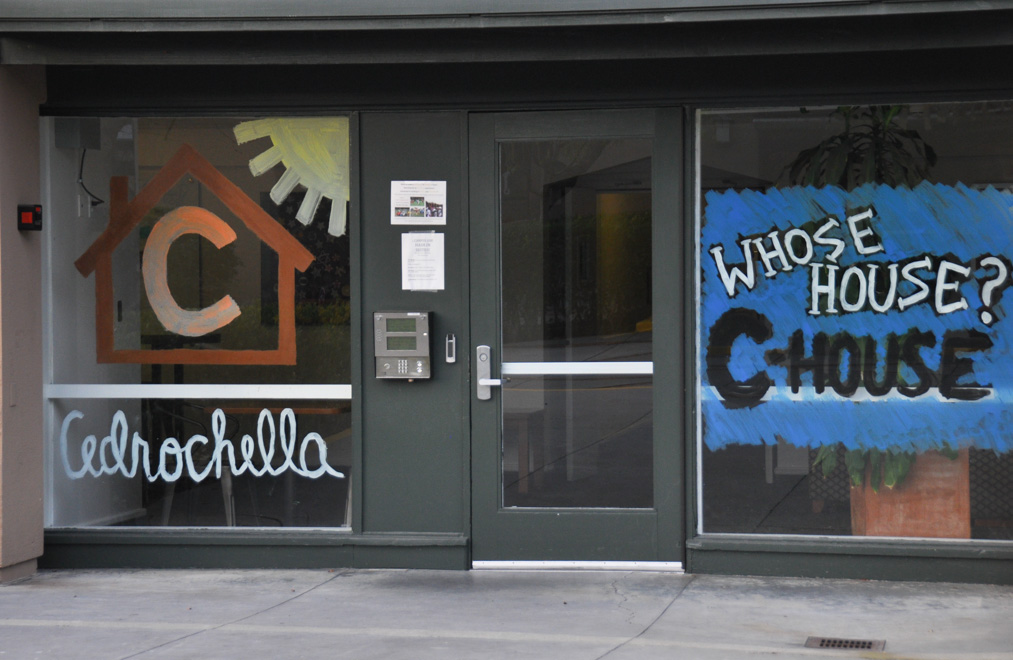Kavita Sarin, a dermatology assistant professor and Cedro’s residential fellow (RF), lives with her husband, Dan Wan, her two children and their dog.
Cedro, in Wilbur Hall, is an all-frosh dorm that housed 88 students last fall and winter, but has been empty since students were sent home in March. With that huge change, this RF family has found other ways to keep busy during the pandemic. The couple’s eight-year-old daughter, Katelyn, has been painting “kindness rocks” with pictures and happy sayings, scattering them around campus for people to find and take home. Their 11-year-old son, Kyle, has been playing Minecraft on the server the Cedro frosh set up before they left campus. Wan has been gardening, reading and building models out of plastic in his spare time. Outside of her work, Sarin has been reading, too, and spending time with her kids and husband.
COVID-19 has altered life for RFs, who are used to living close to dozens of students and contributing to their residential community life, in many ways. The Daily interviewed many RFs, who recounted the impact of COVID-19 on their experiences and the steps that they’re taking to prepare for fall quarter.
“Our goal in Cedro is to not only be a community, but to be a family of lifelong learners where everyone can openly share their sense of wonder, responsibility, curiosity and kindness,” Sarin said.
Sarin defined her and Wan’s roles as residential fellows: “We work with our student staff to build community, create an active residential learning environment and promote the intellectual and emotional well-being of our residents.”
For Sarin, those responsibilities haven’t changed despite the changes COVID-19 has forced upon the RFs.
When asked about the biggest change that she has experienced since the pandemic hit, Sarin said that there were “too many to list.”
A source of inspiration for Sarin and her family comes from C.S. Lewis: “Hardships often prepare ordinary people for extraordinary destiny.” She continued, “I think we’re seeing this happen all around us, and it is inspiring to try to be a source of support and positivity for our community in these challenging times.”
As fall quarter approached, Sarin said she was “excited about the potential to see students back on campus in the fall.” Ultimately, Stanford canceled its plans to bring back students for the fall.
Even so, Sarin and her husband had been brainstorming ways to support the frosh and build community with their new staff, and they had been “confident that [they would] be able to foster community under COVID-19 restrictions.”
Sarin explained that their staff did a great job creating community virtually during spring quarter. Some of the things they did included yoga classes, chat and tea times, a virtual escape room, game nights, walk and talks, a murder mystery, book clubs and a graduation dinner.
“We had activities at least three times a week for our dorm and an active Slack chat community,” she said.
“Our frosh also organized community-building events such as happy hours, TikTok videos, and a printout of Leland Stanford Jr. on a Flat Stanley photo adventure passed by mail among our residents who took photos with it and shared their home adventures,” Sarin added.
Marie-Louise Catsalis and Grant Parker, Toyon’s RFs, experienced a similarly busy spring quarter.
“We were still pretty busy in spring. Even though there were fewer students, there was still quite a lot to do,” Catsalis said.
Catsalis and Parker have two sons together and two dogs.
Catsalis said that her responsibilities continued despite COVID-19’s forcing a majority of the Toyon staff and residents to go home. She and Parker still worked with the staff during the shutdown, training, convening and supervising them via Zoom. They still have weekly meetings, during which they discuss how everything is going with their staff. The staff would normally have their own halls to oversee.
“We really like to see our staff students take the bulk of their responsibilities — it’s really a growing experience for them,” Catsalis said. “Their leadership skills develop during the year.”
Catsalis, Parker and their children usually travel every summer. Catsalis is from Australia, and Parker is from South Africa. Every summer, they make a trip to Australia, South Africa and Germany. Given the pandemic, however, they are not doing any traveling this summer.
Catsalis still has a positive outlook despite not being able to travel.
“It’s been good to stay for my first summer ever here. We’re trying to do a lot of spring cleaning,” she said. Catsalis has also kept busy with music. As a teacher in Stanford’s music department, she has been preparing for online music classes at Stanford. She has been teaching her children music as well.
COVID-19 has brought significant changes to the activities in Toyon. For example, in fall quarter, people in Toyon went with the RFs to Hamilton; and in past years, the RFs would take students living in Toyon to the Getty Villa in Los Angeles.
But Catsalis emphasized that they “will be putting our best foot forward in Zoom and trying to recreate something of the Stanford spirit and trying to do engaging community building.”
Catsalis had also been excited about inviting frosh back and replicating many traditions under new health and safety precautions. Although, with students no longer returning in the fall, these connections and traditions likely won’t happen in person. But, Catsalis said, there are many chances to share music in Toyon Hall, and Catsalis would like to continue that online.
She pointed out the irony that has come about due to the pandemic. Before COVID-19, she would tell those in Toyon, “Turn off your screens and talk to us! And now it’s like, turn on your screens and talk to us!”
Contact Bridget Stuebner at bridget.stuebner ‘at’ gmail.com.
